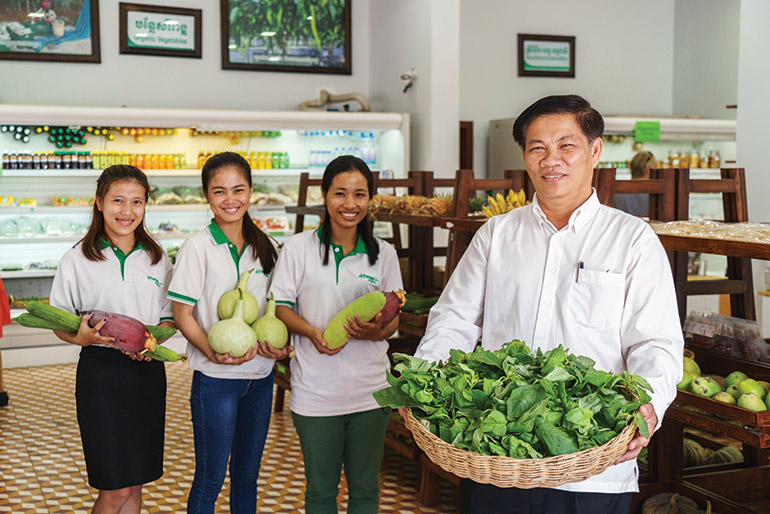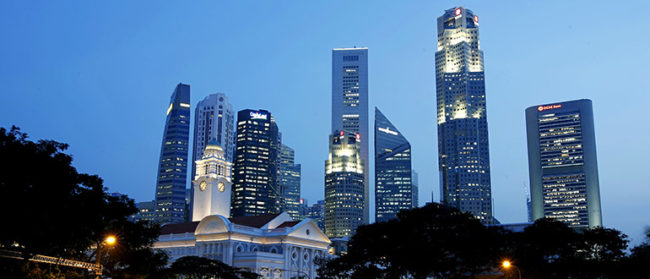Dotted with cafés and bars that wouldn’t look out of place in Melbourne or Berlin, the BKK 1 neighbourhood in central Phnom Penh remains a bourgeois bubble even in Cambodia’s quickly gentrifying capital. So the fact that four organic supermarkets can be found in as many blocks here does not necessarily mean that the organic industry in Cambodia is booming. However, rising incomes and growing dietary awareness are pointing the way toward a more nutritious future.
“After the Pol Pot regime, people did not have the money to spend on high-quality food, but now it’s different. Thanks to social media, more people understand what healthy food is and they now have the budget to spend on organic produce,” said Ieng Sotheara, founder of Khmer Organic Cooperative. Sotheara hopes the company’s farm will soon become the country’s first to receive internationally recognised organic certification from the independent global certification firm Control Union.
Buying organic produce offers obvious health benefits to the consumer, especially in Cambodia, where, Sotheara says, “farmers use excessive amounts of pesticides”.
Switching to organic farming also offers myriad benefits to the farmers themselves. Cambodia lacks the capacity to manufacture its own pesticides and is reliant on foreign imports from China, Thailand and Vietnam. The labels aren’t in Khmer, which means most farmers spray the chemicals without knowing how much should actually be used – an issue that was first brought to the public eye by a group of Danish researchers in 2011.
Adopting organic farming methods would also make sense economically. While chemicals can increase a farmer’s short-term yield and profitability, organic produce fetches a 15% premium in Phnom Penh, according to the Cambodian Centre for Study and Development in Agriculture. Combined with lower production costs due to the use of fewer inputs, the higher prices associated with organic produce can lead to much higher profits, a trend that is particularly evident in the organic rice sector, according to Claudius Bredehoeft, the national project coordinator of the Asean Sustainable Agrifood Systems project.
“If you look at the rice sector right now in Cambodia it’s suffering from low prices. But the organic market provides stable and high prices and, even though it is a niche market, the demand for organic rice from Cambodia is still higher than the supply,” he said.
But, despite the benefits, most farmers are unwilling to take a leap of faith, with only 0.2% of Cambodia’s total agricultural land farmed organically in 2015, according to the 2017 World of Organic Agriculture: Statistics & Emerging Trends report.
“Most of the farmers stick to chemicals because they’ve used them for a long time,” Sotheara said. “We need to work a lot to prove to the farmers that organic farming has a lot of benefits and that the cost of production can often be much lower than conventional farming.”
Bredehoeft added, however, that such resistance to change is understandable given that it can take up to three years for farmers to reap these benefits and that many of Cambodia’s rural majority are teetering on the precipice of poverty. “If you are a farmer and your livelihood is relying on the next harvest then it’s understandable that you want to protect your harvest and spray your crop with chemicals,” he said.
Limited education means many Cambodian farmers are particularly susceptible to the sales techniques employed by pesticide vendors, with a report in March’s Science of the Total Environment journal stating that “pesticide use was 251% higher when the [Cambodian] farmer sought advice from pesticide shopkeepers”.
While the 2011 Law on the Management of Pesticides and Fertilisers prohibits the use of particularly dangerous chemicals, the space between the letter of the law and its implementation remains significant, according to Van Touch, a Cambodian postdoctoral fellow at the University of Sydney’s Faculty of Agriculture and Environment.
“I think there is a large gap between policy and real practice,” he said. “The government is working on formulating more regulations and implementing biosecurity and sanitary and phytosanitary measures. But how effective they are in practice, I don’t know.”
Bredehoeft, however, was optimistic that things were moving in the right direction, with the government ramping up its efforts to promote organic agriculture as a way of boosting exports and the Khmer Organic Cooperative and agricultural NGOs working to disseminate information about organic farming to rural communities. “In a nutshell, it’s about education and awareness. And it will take time,” he said. “Organic farming is about a long-term vision.”


